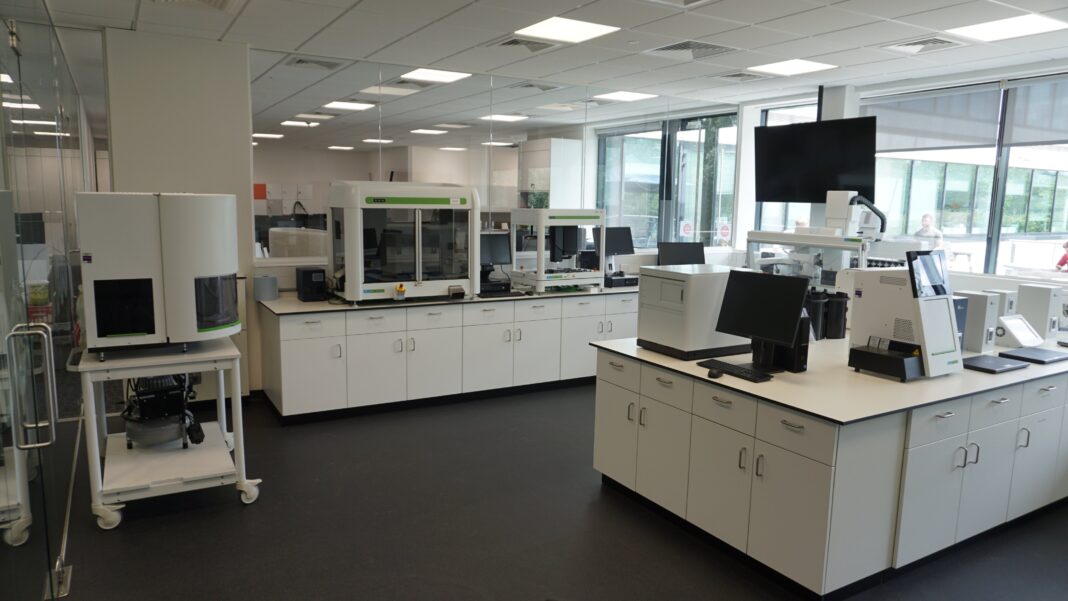Revvity, a company providing life science and diagnostics solutions, including automation and services for drug discovery and research, recently opened its new Scientific Center of Excellence in Cambridge, U.K. The 30,000 ft2 facility, which was originally home to Horizon Discovery which specializes in cell engineering, has been refurbished for an undisclosed cost to house many of Revvity’s (formerly affiliated with PerkinElmer) automated liquid handling and screening systems.

“Cambridge in the U.K. has been traditionally associated with groundbreaking genomic science and has a healthy hub of life science companies and world-class academic research,” explains Bryan Kipp, VP/general manager, life sciences strategy, and integration. “The acquisition of Horizon in 2020 by PerkinElmer meant that we had a key asset in Cambridge, with experts here that have decades of expertise in gene editing and cell line modulation.
“By marrying that experience with many of the automation skills from Revvity we can have all that expertise on one site, making Cambridge an ideal location for our Center of Excellence.”
“By harnessing the wealth of talent in the local ecosystem, we are not only contributing to U.K.’s economy and life sciences industry, but we are also expanding human potential through science, bringing to life Revvity’s purpose of revolutionizing health science for a healthier humankind,” adds Chris Hughes, managing director, North Europe, Revvity.

The major focus of the Cambridge site is to offer tools and services for helping scientists accelerate their understanding of the genomic basis of biological pathways and mechanisms of disease. There are laboratories for cell line engineering and cell screening utilizing technologies such as CRISPR and the Pin-point™ base editing system, a next-generation, modular, gene editing platform which, according to Revvity’s scientists, has a strong safety profile compared to traditional CRISPR technologies. There are also labs providing molecular reference standards used in the development of diagnostics tests, as well as engineered biomanufacturing cell lines to enable more efficient upstream bioprocessing for manufacturing biotherapeutics.
In addition to the service laboratories, Revvity has also added a new demonstration laboratory to its Cambridge facility. This lab will allow Revvity to showcase its automation portfolio, including liquid handling, cell counting, imaging and analysis solutions, offering scientists the chance to experience first-hand what these technologies could bring to their research.

“Our demo lab enables customers and potential customers to evaluate our automation technology for drug discovery and academic research in one place,” comments Alan Fisher, sales leader, U.K. Ireland, Revvity. “For example, we have our liquid handling systems that can work with a range of plate formats from 96-well through to 384 and 1536-well plates and our Opera Phenix® system for high-throughput high-content assays with live cells, primary cells and microtissues.
“Having our demo lab on the same site as the scientists actually working with the equipment for gene editing and drug discovery is a great milestone. It means we can provide customer training and user group meetings and customers can see how our own scientists are using the systems in a real-world context.”
Strength in numbers
Revvity’s Scientific Center of Excellence in Cambridge employs approximately 200 people. Establishment of this site strengthens the company’s position in the life sciences sector of the U.K. where Revvity currently has a diagnostics facility in Oxford, from which it delivers the only regulated ELISPOT assays for T cell measurement, and a tuberculosis test, used by the U.K. National Health Service (NHS).
The company also has a global Center of Excellence for life sciences instrument manufacturing in Llantrisant, South Wales, and an immunodiagnostics site in Boldon, as well as a genomics sequencing laboratory at Alderley Park.
“We’re entering a new age of drug discovery, with biological complexity and the development of diagnostic tools to help identify, monitor, and diagnose patients, becoming increasingly important in the creation of novel therapeutics,” notes Kipp.
Sue Pearson, PhD, is a freelance science writer based in the U.K.


